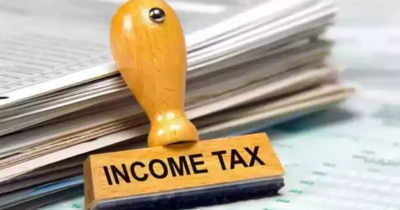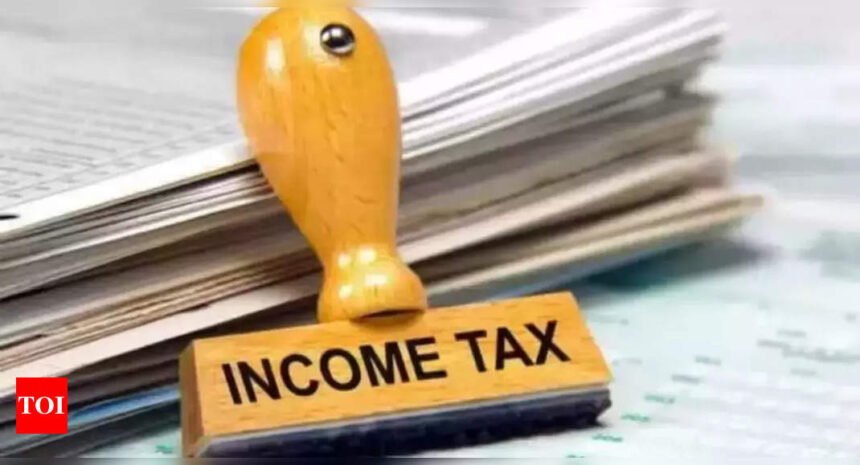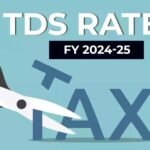[ad_1]

NEW DELHI: The finance ministry will be initiating its pre-Budget meetings from October 10 which will continue till November 11, reviewing six ministries and departments, including new & renewable energy and skill development & entrepreneurship.
Before the commencement of the budget sessions, several crucial changes will be coming into effect from October 1, which were introduced by Union finance minister Nirmala Sitharaman in the Union Budget 2024, some of which are already effective.These changes include the Aadhaar card, STT, TDS rate, Direct Tax Vivad Se Vishwas Scheme 2024.
Aadhar no longer applicable for PAN and ITR
The Union Budget 2024 proposed the discontinuation of quoting of Aadhaar Enrolment ID instead of the Aadhaar number to prevent misuse and duplication. Usage of Aadhaar in ITRs, and PAN applications will no longer be applicable, from October 1.
As per Economic Times, the budget memorandum stated, “The said provisions allowing the quoting of Aadhaar Enrolment ID in application form for allotment of PAN or in the return of income, was introduced in 2017. Since then, as per data available in public domain, coverage of Aadhaar number has been increasing, and has encompassed majority of the population in India.” It is imperative to discontinue the option of quoting of the Enrolment ID of Aadhaar application form, as any allotment of PAN against the Enrolment ID may lead to duplication and misuse of PAN, they added.
Securities Transaction Tax
The Securities Transaction Tax applied to futures and options trading will also be increased from October 1, surging by 0.02 per cent and 0.1 per cent, respectively. Notably, the STT will be imposed on both the buying and selling of various securities, including equity shares, futures, and options. Income receipts from share buybacks would also be taxable under the hands of beneficiaries. This reform aims to align with the ever growing market activity to ensure that the transaction values are represented appropriately by the tax levels.
Floating rate bonds TDS
As per the 2024 budget reforms, tax deducted at source (TDS) will be deducted at a rate of 10 per cent from specified central and state government bonds, including floating rate bonds. It would be deducted after a threshold limit of Rs 10,000 which implies that no TDS is applicable if the annual earning is less than Rs 10,000.
The budget also proposes to modify Section 193 of the Income Tax Act, 1961 to impose TDS on the Floating Rate Savings Bond, 2020 (Taxable).
TDS rates
The TDS rate falling under sections 19DA, 194H, 194-IB, 194M, 194F, 194-O and 194G have been reduced from 5 per cent to 2 per cent in the Finance Bill.
TDS rate for e-commerce operators reduced from 1 per cent to 0.1 per cent.
Section 194DA – Payment in respect of life insurance policy
Section 194G – Commission on sale of lottery tickets
Section 194H – Payment of commission or brokerage
Section 194-IB – Payment of rent by certain individuals or HUFs
Section 194M – Payment of certain sums by certain individuals or HUFs
Section 194F – Payment in case of repurchase of units by a mutual fund or UTI is proposed to be deleted from 1st October 2024.
Section 194-O – Payment of certain sum by e-commerce operator to e-commerce participants
Direct Tax Vivaad se Vishwas Scheme 2024
Direct Tax Vivaad se Vishwas Scheme, 2024 (DTVSV, 2024) has been announced by the Central Board of Direct Taxes (CBDT) in order to settle pending appeals in income tax disputes. It provides for a lower settlement amount for the ‘new appellant’ as compared to the ‘old appellant’. Besides, it also includes a provision for a lower settlement amount for taxpayers who declare before 31 December 2024 as compared to those who declare thereafter.
Buy-back of shares
From October 1, much like dividends, the buyback of shares will be subject to shareholder-level taxes, resulting in a higher tax burden for investors. Furthermore, the shareholder’s acquisition costs of these shares would be considered while calculating any capital gains or losses.
The budget meetings held, will aim to finalize the revised estimates for the current fiscal year and discuss budgetary allocations for 2025-26. The Ministry of Railway and Department of Health and Family Welfare will be discussed on the last day.
It is expected that the Union Budget 2025-26 would be centered around reforms to help accelerate growth by boosting job creation and economic demand.
“Pre-budget meetings chaired by the Secretary (Expenditure) shall commence in the second week of October 2024. Financial Advisers shall ensure that necessary details…are properly entered in UBIS (Union Budget Information System) before/latest by October 7, 2024,” the Budget circular 2025-26 issued by Department of Economic Affairs said.
During pre-Budget meetings, requirement of funds for all categories of expenditures along with receipts of ministries/departments and expenditure estimates on net basis are to be discussed. The Budget 2025-26 is likely to be presented on February 1 during the first half of Parliament’s Budget session which usually begins in the last week of January every year.
!(function(f, b, e, v, n, t, s) { function loadFBEvents(isFBCampaignActive) { if (!isFBCampaignActive) { return; } (function(f, b, e, v, n, t, s) { if (f.fbq) return; n = f.fbq = function() { n.callMethod ? n.callMethod(...arguments) : n.queue.push(arguments); }; if (!f._fbq) f._fbq = n; n.push = n; n.loaded = !0; n.version = '2.0'; n.queue = []; t = b.createElement(e); t.async = !0; t.defer = !0; t.src = v; s = b.getElementsByTagName(e)[0]; s.parentNode.insertBefore(t, s); })(f, b, e, 'https://connect.facebook.net/en_US/fbevents.js', n, t, s); fbq('init', '593671331875494'); fbq('track', 'PageView'); };
function loadGtagEvents(isGoogleCampaignActive) { if (!isGoogleCampaignActive) { return; } var id = document.getElementById('toi-plus-google-campaign'); if (id) { return; } (function(f, b, e, v, n, t, s) { t = b.createElement(e); t.async = !0; t.defer = !0; t.src = v; t.id = 'toi-plus-google-campaign'; s = b.getElementsByTagName(e)[0]; s.parentNode.insertBefore(t, s); })(f, b, e, 'https://www.googletagmanager.com/gtag/js?id=AW-877820074', n, t, s); };
function loadSurvicateJs(allowedSurvicateSections = []){ const section = window.location.pathname.split('/')[1] const isHomePageAllowed = window.location.pathname === '/' && allowedSurvicateSections.includes('homepage')
if(allowedSurvicateSections.includes(section) || isHomePageAllowed){ (function(w) {
function setAttributes() { var prime_user_status = window.isPrime ? 'paid' : 'free' ; w._sva.setVisitorTraits({ toi_user_subscription_status : prime_user_status }); }
if (w._sva && w._sva.setVisitorTraits) { setAttributes(); } else { w.addEventListener("SurvicateReady", setAttributes); }
var s = document.createElement('script'); s.src="https://survey.survicate.com/workspaces/0be6ae9845d14a7c8ff08a7a00bd9b21/web_surveys.js"; s.async = true; var e = document.getElementsByTagName('script')[0]; e.parentNode.insertBefore(s, e); })(window); }
}
window.TimesApps = window.TimesApps || {};
var TimesApps = window.TimesApps;
TimesApps.toiPlusEvents = function(config) {
var isConfigAvailable = "toiplus_site_settings" in f && "isFBCampaignActive" in f.toiplus_site_settings && "isGoogleCampaignActive" in f.toiplus_site_settings;
var isPrimeUser = window.isPrime;
var isPrimeUserLayout = window.isPrimeUserLayout;
if (isConfigAvailable && !isPrimeUser) {
loadGtagEvents(f.toiplus_site_settings.isGoogleCampaignActive);
loadFBEvents(f.toiplus_site_settings.isFBCampaignActive);
loadSurvicateJs(f.toiplus_site_settings.allowedSurvicateSections);
} else {
var JarvisUrl="https://jarvis.indiatimes.com/v1/feeds/toi_plus/site_settings/643526e21443833f0c454615?db_env=published";
window.getFromClient(JarvisUrl, function(config){
if (config) {
const allowedSectionSuricate = (isPrimeUserLayout) ? config?.allowedSurvicatePrimeSections : config?.allowedSurvicateSections
loadGtagEvents(config?.isGoogleCampaignActive);
loadFBEvents(config?.isFBCampaignActive);
loadSurvicateJs(allowedSectionSuricate);
}
})
}
};
})(
window,
document,
'script',
);
[ad_2]
Source link








